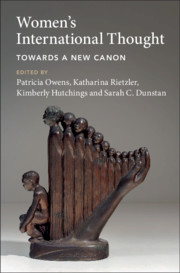Book contents
- Women’s International Thought: Towards a New Canon
- Women’s International Thought: Towards a New Canon
- Copyright page
- Contents
- Preface and Acknowledgments
- Introduction
- 1 Field and Discipline
- 2 Geopolitics and War
- 3 Imperialism
- 4 Anticolonialism
- 5 International Law and International Organization
- 6 Diplomacy and Foreign Policy
- 7 World Peace
- 8 World Economy
- 9 Men, Women, and Gender
- 10 Public Opinion and Education
- 11 Population, Nation, Immigration
- From “The Right of Nations to Self-Determination” (1907)
- From Pivot of Civilization (1922)
- From Modern Immigration (1925)
- From Neuroses of the Nations (1925)
- From The Protection of Minorities (1928)
- From “Caravans of Sorrow: Noncitizen Americans of the Southwest” (1940)
- From “Conditional Philanthropy towards Colored Students in Britain” (1960)
- From “Minority Peoples in China” (1961)
- Rosa Luxemburg
- Margaret Sanger
- Annie Marion Maclean
- Caroline Playne
- Lucy Philip Mair
- Luisa Moreno
- Sheila Kitzinger
- Shirley Graham
- 12 Technology, Progress, and Environment
- 13 Religion and Ethics
- Index
Annie Marion Maclean
from 11 - Population, Nation, Immigration
Published online by Cambridge University Press: 12 April 2022
- Women’s International Thought: Towards a New Canon
- Women’s International Thought: Towards a New Canon
- Copyright page
- Contents
- Preface and Acknowledgments
- Introduction
- 1 Field and Discipline
- 2 Geopolitics and War
- 3 Imperialism
- 4 Anticolonialism
- 5 International Law and International Organization
- 6 Diplomacy and Foreign Policy
- 7 World Peace
- 8 World Economy
- 9 Men, Women, and Gender
- 10 Public Opinion and Education
- 11 Population, Nation, Immigration
- From “The Right of Nations to Self-Determination” (1907)
- From Pivot of Civilization (1922)
- From Modern Immigration (1925)
- From Neuroses of the Nations (1925)
- From The Protection of Minorities (1928)
- From “Caravans of Sorrow: Noncitizen Americans of the Southwest” (1940)
- From “Conditional Philanthropy towards Colored Students in Britain” (1960)
- From “Minority Peoples in China” (1961)
- Rosa Luxemburg
- Margaret Sanger
- Annie Marion Maclean
- Caroline Playne
- Lucy Philip Mair
- Luisa Moreno
- Sheila Kitzinger
- Shirley Graham
- 12 Technology, Progress, and Environment
- 13 Religion and Ethics
- Index
Summary
After having viewed the immigration situation in the seven countries selected for this study, the question naturally arises whether there are observable in these countries any common aims. One express determination does seem to be present in all, and that is to admit only such immigrants as will cause no permanent impairment of the national standards of living. Each country has its own aims and ambitions for the future, which have been derived from the type of people who first developed its resources, or from those whom each nation calls the native-born. This really means those groups who relatively early succeeded to places of importance. It is thus that Nordics prevail in one nation, and Alpines or Mediterraneans in another, and each values most its own distinctive characteristics. Besides this, for varying reasons, there is likely to be found in each country preferential alignment with certain other racial or national groups. For example, the Germans, who are predominantly Nordics, because of occupational adaptability, are desired in Brazil, which is of other basic stock. But such apparent exceptions do not obscure the fact that there has developed a national consciousness and self-appreciation in each nation which makes it openly question the wisdom of admitting into its midst aliens with standards varying widely from its own. The colored races have been the first to come under the ban, with considerable objection against the Orientals. Each nation is certain that it does not want its present character to suffer deterioration by the further admixture of unassimilable groups; and all view with suspicion those races having divergent physical, economic, and religious standards. An English-speaking white man’s civilization seems to be the accepted standard in all but the South American republics where the Latin tongues take first place. Even in Brazil are now indications of a color-line. This much, then, the countries under observation have in common in respect to their immigration policies. The World War having focused attention upon the structural weakness of a nation made up of a polyglot people, greater homogeneity of population has since become the watchword. […]
- Type
- Chapter
- Information
- Women's International Thought: Towards a New Canon , pp. 598 - 602Publisher: Cambridge University PressPrint publication year: 2022



